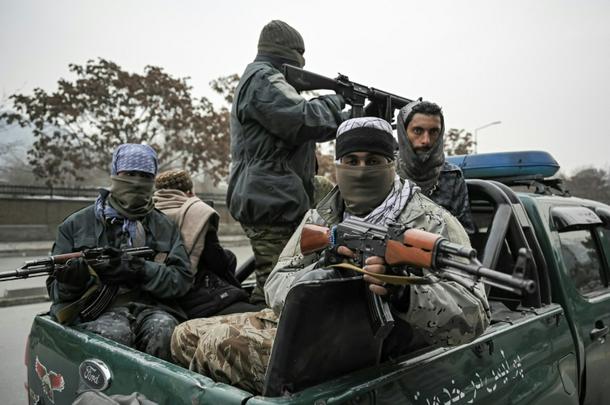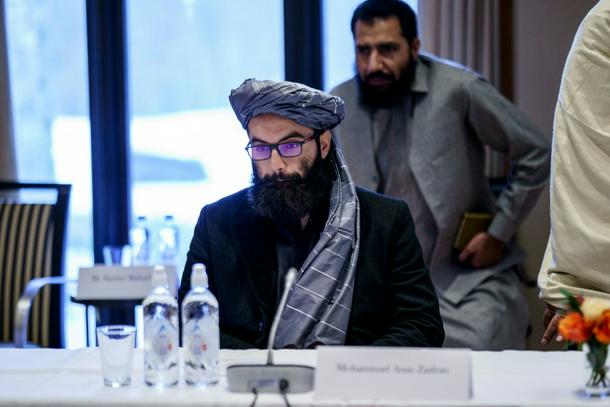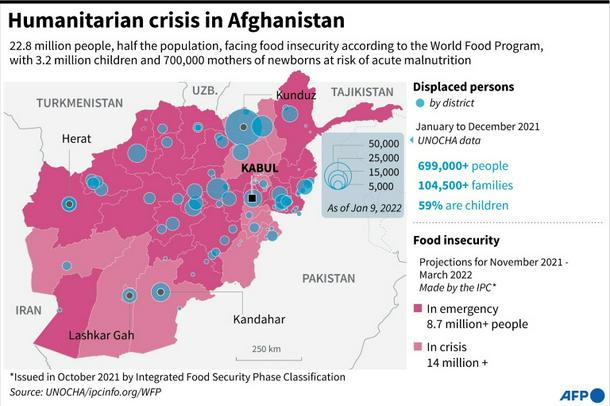
No country has yet recognised the Taliban government
Oslo (AFP) - In their first visit to Europe since returning to power, the Taliban held landmark talks with Western diplomats in Oslo on Monday about the humanitarian crisis in Afghanistan, where millions are suffering from hunger.
The international community has however insisted the Taliban must respect human rights before aid can resume to the country.
Having accepted a controversial invitation from Norway, the Taliban began talks just after 0930 GMT with representatives of the United States, France, Britain, Germany, Italy, the European Union and Norway.
The closed-door discussions are being held at the Soria Moria Hotel, on a snowy hilltop outside Oslo, with the Taliban delegation led by Foreign Minister Amir Khan Muttaqi.
Afghanistan’s humanitarian situation has deteriorated drastically since last August when the fundamentalists stormed back to power 20 years after being toppled.
International aid came to a sudden halt, worsening the plight of millions of people already suffering from hunger after several severe droughts.
Thomas West, the US special representative for Afghanistan, tweeted on Sunday: “As we seek to address humanitarian crisis together with allies, partners, and relief orgs, we will continue clear-eyed diplomacy with the Taliban regarding our concerns and our abiding interest in a stable, rights-respecting and inclusive Afghanistan.”
The Taliban meanwhile hope that meetings of this kind will help legitimise their government.
No country has yet recognised the Taliban regime. Norway has stressed that the talks would “not represent a legitimisation or recognition of the Taliban”.

The participation of Anas Haqqani, a leader of the most feared and violent faction of the Taliban movement, has been heavily criticised
“But we must talk to the de facto authorities in the country. We cannot allow the political situation to lead to an even worse humanitarian disaster,” Norwegian Foreign Minister Anniken Huitfeldt stressed last week.
Members of the Afghan diaspora have criticised the Norwegian invitation, and several protests have been held outside the foreign ministry in Oslo.
Since August, international aid, which financed around 80 percent of the Afghan budget, has been suspended and the United States has frozen $9.5 billion in assets in the Afghan central bank.
Unemployment has skyrocketed and civil servants’ salaries have not been paid for months in the country, already ravaged by several severe droughts.
Hunger now threatens 23 million Afghans, or 55 percent of the population, according to the United Nations, which says it needs $4.4 billion from donor countries this year to address the humanitarian crisis.
- Hopes for mutual understanding -
The international community is waiting to see how the Taliban intend to govern after being accused of trampling on human rights during their first stint in power between 1996 and 2001.
While the Islamists claim to have modernised, women are still largely excluded from public-sector employment and most secondary schools for girls remain closed.
Two women activists disappeared last week in Kabul.

Graphic on projected food insecurity in Afghanistan, by province for November 2021 to March 2022, and location of internally displaced persons
Before meeting the Taliban, the Western diplomats held talks early Monday with members of Afghanistan’s civil society, including women activists and journalists, who had themselves held talks the day before with the hardline Islamists on human rights.
One of those attending the meetings, women’s rights activist Jamila Afghani, told AFP “it was a positive icebreaking meeting” where the Taliban “displayed goodwill”, but it remained to be seen “what their actions will be”.
On Monday, another woman activist in Oslo, Mahbouba Seraj, said the Taliban “acknowledged us and they heard us”.
“I’m hopeful. I’m hoping for some kind of an understanding of each other”, she told reporters.
Meanwhile, tweeting what he called a “joint statement” after the Sunday talks, Taliban spokesman Zabihullah Mujahid said “the participants recognised that understanding and joint cooperation are the only solutions.”
The 15 members of the all-male Taliban delegation arrived in Oslo on Saturday aboard a plane chartered by the Norwegian government.
Among them was Anas Haqqani, a leader of the most feared and violent faction of the Taliban movement –- the Haqqani network, responsible for some of the most devastating attacks in Afghanistan.
His participation has been heavily criticised on social media.
According to Norwegian media, a Norwegian-Afghan has filed a police complaint in Oslo against Haqqani for war crimes.
“This hurts. It’s as if Anders Behring Breivik (the Norwegian rightwing extremist who killed 77 people in 2011) came to a country” as a delegate, Zahir Athari told public broadcaster NRK.